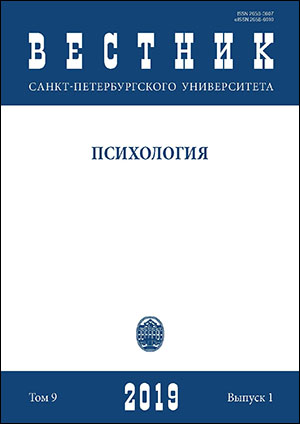The Long-term Effect of Low Recognition of To-be-forgotten Items Requires an Intention to Forget in Conjunction with a Means of Doing so
DOI:
https://doi.org/10.21638/11701/%20spbu16.2019.105Abstract
In the present paper, we reviewed the studies relevant to the issue of intentional forgetting and assumed that it would be reasonable to examine whether the intention to forget itself decreases the probability to retrieve the to-be-forgotten stimulus or it should be combined with forgetting-evoking means. We reported the empirical study intended to verify their independence or interdependence. 20 Russian — made up language word pairs were exposed to participants (N = 71) three times. They then viewed each Russian word from a pair once, with randomized instructions “Forget”, “Remember”, “Repeat”, “Forget by generating associations to the Russian word” or a short cognitive task. Self-reports on the mnemonic strategies were collected. Recognition tests were administered two times — four hours and two months (N = 32) later. The probability to succeed by chance was 1 to 3. The main findings consisted of the fact that at two months delay the made-up words in the “Forget” and the “Remember” conditions were recognized the best, the words that were not processed in the context of any conscious mnemonic goals (“Repeat” and “Task”) were recognized worse, and the words in the “Forget by generating associations to the Russian word” condition were recognized the worst. This result brings us to the conclusion that the intention to achieve any goal with mnemonic content itself protects the material from forgetting at long time intervals. In contrast, the conjunction of mnemonic goal with congruent means might form a psychological tool that makes possible to keep the initial intention effective.
Keywords:
intentional forgetting, mnemonic action, mnemonic goal, forgetting-evoking means, recognition
Downloads
References
Zhang Q., Qi M., Li F., Li H. // International Journal of Psychophysiology. 2016. Vol. 104. P. 1–9.
References
demand characteristics. Psychonomic Bulletin & Review, 1999, vol. 6, no. 1, pp. 123–129.
directed forgetting. Journal of Memory and Language, 2009, vol. 61, no. 1, pp. 134–152.
Downloads
Published
How to Cite
Issue
Section
License
Articles of "Vestnik of Saint Petersburg University. Psychology" are open access distributed under the terms of the License Agreement with Saint Petersburg State University, which permits to the authors unrestricted distribution and self-archiving free of charge.




